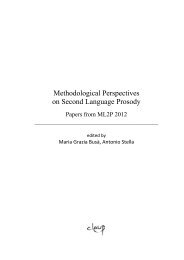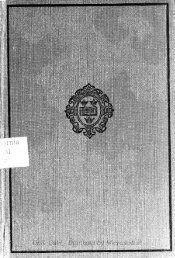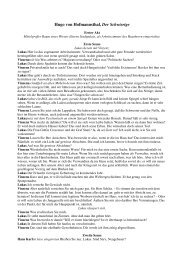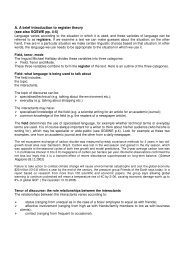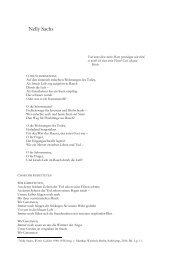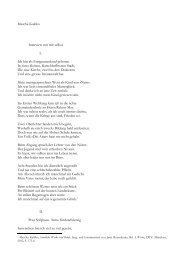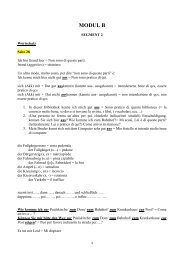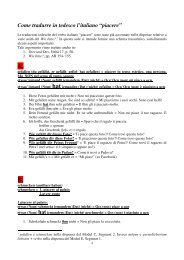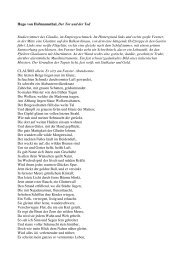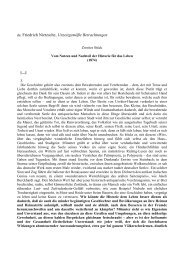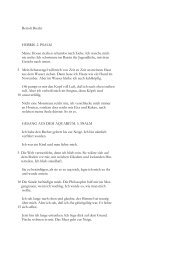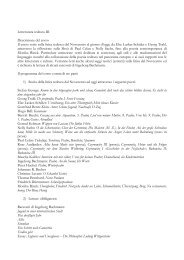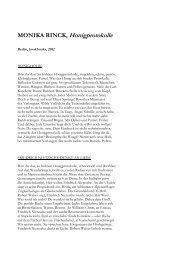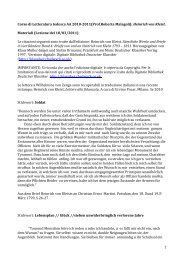1 They Never Wept, the Men of my Race: Antjie Krog's Country of my ...
1 They Never Wept, the Men of my Race: Antjie Krog's Country of my ...
1 They Never Wept, the Men of my Race: Antjie Krog's Country of my ...
Create successful ePaper yourself
Turn your PDF publications into a flip-book with our unique Google optimized e-Paper software.
4<br />
some reviewers; instead it is <strong>the</strong> author’s attempt to make explicit <strong>the</strong><br />
connections between her life and her letters, between <strong>the</strong> name <strong>of</strong> her ancestors<br />
and her work as a reporter on <strong>the</strong> Truth and Reconciliation Commission.<br />
In <strong>Country</strong> <strong>of</strong> <strong>my</strong> Skull Krog makes more than a few references to <strong>the</strong> fact that it<br />
is explicitly not poetry she is writing. So she is using <strong>the</strong> poet’s signature (<strong>Antjie</strong><br />
Krog ra<strong>the</strong>r than Samuel), only to erase it, to resist it. The book ends with a<br />
poem written by Krog, but significantly in English. The argument will return to<br />
this poem, but here it is useful to quote <strong>the</strong> last few lines to make <strong>my</strong> point about<br />
whom <strong>the</strong> book addresses:<br />
You whom I have wronged, please<br />
Take me<br />
With you. 12<br />
The signature which seems, <strong>the</strong>n, in <strong>the</strong> first place to indicate that this text is<br />
written for fellow-Afrikaners, addressed to <strong>the</strong>m/us is misleading. A number <strong>of</strong><br />
things, including this concluding poem, contradict this expectation. In <strong>the</strong> first<br />
place, <strong>the</strong> text is written in English, and has not (yet) been translated into<br />
Afrikaans. Unlike Krog’s o<strong>the</strong>r works, it was not published by her Afrikaner<br />
establishment publishers Human & Rousseau, but – in South Africa as well as in<br />
<strong>the</strong> United States - by Random House (a resonantly named publisher in <strong>the</strong><br />
context <strong>of</strong> this text which is so concerned with cultural homelessness). The book<br />
is dedicated in <strong>the</strong> following way ‘for every victim who had an Afrikaner surname<br />
on her lips’. This need not imply that <strong>the</strong>se victims are <strong>the</strong> only, or even primary,<br />
readers; but in this dedication Krog sets up an identification between <strong>the</strong><br />
signature (on <strong>the</strong> cover) and <strong>the</strong> Afrikaans name uttered by <strong>the</strong> ‘victim’. The<br />
extended title <strong>of</strong> <strong>the</strong> US edition, recently published by Times Books, a division <strong>of</strong><br />
Random House, <strong>Country</strong> <strong>of</strong> My Skull: Guilt, Sorrow, and <strong>the</strong> Limits <strong>of</strong><br />
Forgiveness in <strong>the</strong> New South Africa, 13 gives a more pessimistic gloss to <strong>the</strong><br />
original title, and also sets up an opposition between guilt and forgiveness, with<br />
sorrow as <strong>the</strong> term that possibly mediates between <strong>the</strong> two.<br />
On <strong>the</strong> cover <strong>of</strong> <strong>the</strong> US edition Krog’s name is smaller, <strong>the</strong> title bigger; and Krog<br />
is ‘introduced’ by Charlayne Hunter-Gault, award-winning US journalist and<br />
currently National Public Radio’s chief correspondent in Africa. Hunter-Gault’s<br />
introduction adds little that <strong>the</strong> South African introduction, called ‘Publisher’s<br />
Note’, 14 does not say; its value lies in <strong>the</strong> fact that Charlayne Hunter-Gault<br />
associates herself with <strong>the</strong> project, has a similar signature for US readers and<br />
viewers to Krog’s for South African readers and listeners.<br />
12 A. Krog, <strong>Country</strong> <strong>of</strong> My Skull (Johannesburg, Random House, 1998), p. 279.<br />
13 A. Krog, <strong>Country</strong> <strong>of</strong> My Skull: Guilt, Sorrow, and <strong>the</strong> Limits <strong>of</strong> Forgiveness in <strong>the</strong> New South<br />
Africa (New York, Random House, 1999).<br />
14 A. Krog, <strong>Country</strong> <strong>of</strong> My Skull (Johannesburg, Random House, 1998), pp. vi-viii.



